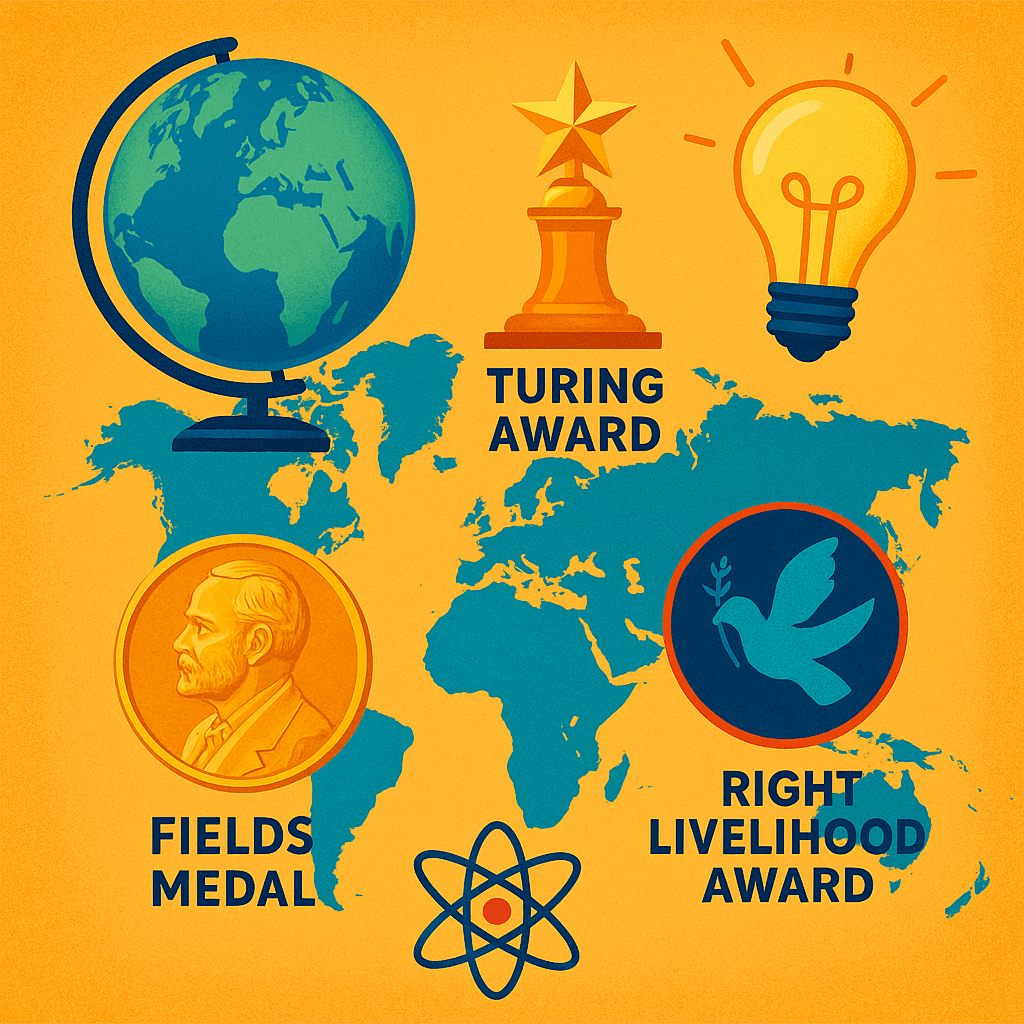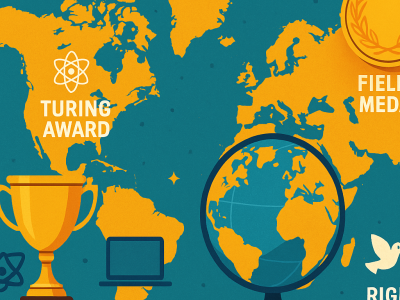When a scientist, artist, or humanitarian receives an esteemed award, it is often the culmination of a lifetime of dedication, innovation, or service. The Nobel Prize may dominate these discussions, but a range of other globally recognised prizes celebrate exceptional achievements across multiple disciplines. While the Nobel is revered in science, peace, and literature, these awards acknowledge significant contributions in fields that have often been overlooked by traditional recognitions. So, what are the top prizes outside of the Nobel family, and how do they compare in prestige, impact, and recognition?
Science and Technology
Turing Award: The Nobel of Computing
In the world of computing, few honours are as coveted as the Turing Award. Often regarded as the “Nobel of Computing”, it is awarded annually by the Association for Computing Machinery (ACM). This prestigious award recognises lasting contributions to the field of computer science, with past recipients including pioneers such as Donald Knuth and Vint Cerf. With a prize value of $1 million, the Turing Award offers both substantial financial rewards and global recognition, firmly establishing its place as one of the most esteemed prizes in the tech industry.
Fields Medal: The pinnacle of Mathematical achievement
Mathematics, a cornerstone of scientific progress, has long been without an equivalent to the Nobel Prize. The Fields Medal, often seen as the highest award in mathematics, serves this role. This accolade is awarded every four years to mathematicians under the age of 40 who have demonstrated exceptional achievements. With a monetary value of CAD 15,000 and a prestigious gold medal, it is considered the ultimate recognition for young mathematicians and is often described as the “Nobel Prize” of mathematics.
Abel Prize: Lifetime Contributions to Mathematics
While the Fields Medal celebrates the achievements of young mathematicians, the Abel Prize recognises outstanding lifetime contributions to the field. Named after the Norwegian mathematician Niels Henrik Abel, this prize has been awarded annually since 2003. The prize, worth NOK 7.5 million (approximately $750k), is given by the Norwegian Academy of Science and Letters and has been received by some of the most renowned figures in mathematics. It complements the Fields Medal, allowing the mathematical community to acknowledge a broader range of achievements across generations.
Breakthrough Prizes: Transformative Advances in Multiple Disciplines
Established in 2012 by tech industry billionaires, the Breakthrough Prizes have quickly risen to prominence in several fields: Life Sciences, Fundamental Physics, and Mathematics. Each prize is worth an impressive $3 million, making it one of the largest monetary awards for scientific achievement. The prizes are awarded for transformative advances that have revolutionised their respective fields. These awards highlight cutting-edge research that pushes the boundaries of human knowledge and innovation, often offering a high-profile platform for new discoveries.
Crafoord Prize: Filling the Gaps Left by the Nobel
The Crafoord Prize, awarded by the Royal Swedish Academy of Sciences, is unique in that it complements the Nobel Prize by recognising areas that are not covered by the Nobel, such as astronomy, ecology, rheumatology, and mathematics. Each year, this prestigious award provides a significant financial reward of SEK 6 million (approximately $600k) to recipients whose work advances human understanding in these vital but often overlooked fields.
Peace and Humanitarian
Right Livelihood Award: The Alternative Nobel
Often referred to as the “Alternative Nobel”, the Right Livelihood Award honours individuals or organisations whose work has practical solutions to global challenges. Focused on environmentalism, human rights, and peace, this award is a testament to those who address the world’s most pressing issues. Established in 1980, the prize offers SEK 1 million (around $100k) and shines a spotlight on the unsung heroes who make tangible, positive impacts on society.
Indira Gandhi Peace Prize: Promoting Global Cooperation
In the realm of peace and international cooperation, the Indira Gandhi Peace Prize holds significant weight. Awarded by India, the prize recognises contributions to global peace, disarmament, and cooperation across nations. The award’s value stands at ₹2.5 million (approximately $30k) and has been given to individuals such as Nelson Mandela, Aung San Suu Kyi, and the United Nations, symbolising international efforts to achieve global peace.
Literature and Arts
Man Booker International Prize: Celebrating Translated Fiction
In the literary world, the Man Booker International Prize is one of the most prestigious awards for translated fiction. Unlike other literary awards, this prize acknowledges the work of both the author and the translator, highlighting the essential role of translation in making literary works accessible across cultures. With a prize of £50,000 split between the author and translator, this award has become a key milestone for writers whose works transcend national boundaries.
Pulitzer Prize: Recognising Excellence in Journalism, Literature, and Music
The Pulitzer Prize is perhaps the most well-known American literary and journalistic accolade, but its impact stretches far beyond the U.S. borders. Awarded in multiple categories including journalism, literature, and music, the Pulitzer Prize carries immense weight in the international sphere. While primarily focused on American contributors, its global influence is undeniable, particularly for authors and journalists whose work impacts worldwide readership.
Kyoto Prize: A Global Celebration of Arts, Philosophy, and Technology
The Kyoto Prize, established by the Inamori Foundation in Japan, recognises outstanding individuals in three categories: Arts, Philosophy, and Advanced Technology. The prize, valued at ¥100 million (approximately $700k), honours those whose work has had a profound impact on humanity. Celebrated worldwide, it is one of the most prestigious non-governmental awards for excellence in these diverse fields.
Environment
Goldman Environmental Prize: Grassroots Environmental Activism
Awarded to six environmental activists annually, the Goldman Environmental Prize is the world’s foremost award for grassroots environmental activism. The award, valued at $200,000, honours individuals who have made significant contributions to environmental protection at the local level. The Goldman Prize is often described as the “Nobel Prize for environmentalists” and shines a spotlight on those who fight for the planet’s preservation through hands-on efforts.
Tyler Prize for Environmental Achievement: A Legacy of Environmental Excellence
Established in 1973, the Tyler Prize for Environmental Achievement honours individuals who have made exceptional contributions to environmental science, policy, or protection. With a prize of $250,000, this award has been granted to a range of distinguished environmental advocates and scientists. It recognises the urgent need for transformative efforts to address environmental degradation, climate change, and sustainability.
Interdisciplinary Awards
Pritzker Architecture Prize: Celebrating Architectural Mastery
Often referred to as the “Nobel of Architecture”, the Pritzker Architecture Prize honours the lifetime achievements of architects who have made significant contributions to the built environment. Valued at $100,000 and awarded annually, the Pritzker Prize is one of the highest honours an architect can receive, highlighting a career of innovative design and vision.
Wolf Prize: Recognising Excellence Across Multiple Disciplines
Awarded annually by the State of Israel, the Wolf Prize is unique in its broad scope, recognising achievements in Agriculture, Chemistry, Mathematics, Medicine, Physics, and the Arts. Each prize is worth $100,000, making it one of the largest cash awards for intellectual achievement. The Wolf Prize stands as a symbol of Israel’s commitment to scientific and cultural advancement, providing a prestigious platform for cross-disciplinary recognition.
Princess of Asturias Awards: Promoting International Cooperation
The Princess of Asturias Awards, given annually by Spain’s Princess of Asturias Foundation, recognise exceptional achievements in areas such as arts, communication, humanities, and international cooperation. Valued at €50,000, this award celebrates global contributions to society and is among the most significant Spanish recognitions of international merit.
Conclusion
From the fields of science and technology to environmental activism, literature, and architecture, these prestigious global prizes provide a benchmark for excellence. They acknowledge exceptional work that transforms industries, societies, and nations. As a researcher, academic, or professional, what drives you to strive for recognition? Is it the desire to push boundaries, inspire change, or make a lasting impact on the world?
The wealth, fame, and recognition associated with these awards not only reflect individual achievement but also elevate the importance of contributions that push humanity forward. As global recognition continues to evolve, one might ask: what role will you play in the future of innovation and societal progress?







